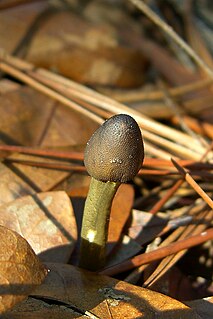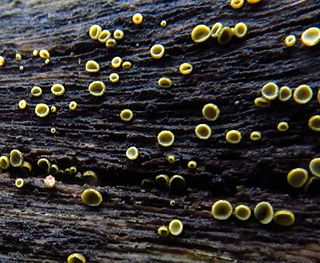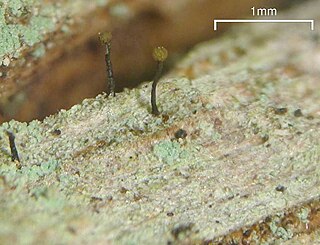Related Research Articles

The Hypocreales are an order of fungi within the class Sordariomycetes. In 2008, it was estimated that it contained some 237 genera, and 2647 species in seven families. Since then, a considerable number of further taxa have been identified, including an additional family, the Stachybotryaceae.

The Saccharomycetaceae are a family of yeasts in the order Saccharomycetales that reproduce by budding. Species in the family have a cosmopolitan distribution, and are present in a wide variety of habitats, especially those with a plentiful supply of carbohydrate sources. The family contains the species Saccharomyces cerevisiae, perhaps the most economically important fungus.

The Dermateaceae is a family of cup fungi in the order Helotiales. Most species in this family are plant pathogens but some are saprobes.

The Amphisphaeriaceae are a family of fungi that is mainly found in parts of New Zealand, South America, Asia and parts of Europe. According to the 2007 Outline of Ascomycota, there are 41 genera placed within the family, although the position of 13 of those genera is uncertain.

The Hyaloscyphaceae are a family of fungi in the Helotiales order. Species in this family have a cosmopolitan distribution, and are saprobic, growing on dead wood and other plant matter.

The Helotiaceae are a family of fungi in the order Helotiales. The distribution of species in the family are widespread, and typically found in tropical areas. There are 117 genera and 826 species in the family.

The Lecanorales are an order of mostly lichen-forming fungi belonging to the class Lecanoromycetes in the division Ascomycota. The order contains 26 families, 269 genera, and 5695 species.

The Lichinaceae are a family of ascomycete fungi. Most species are lichenized, and have a distribution largely in temperate regions.
Bimuria is a genus of fungi in the family Melanommataceae; according to the 2007 Outline of Ascomycota, the placement in this family is uncertain.

The Melanconidaceae are a family of fungi in the order Diaporthales, class Sordariomycetes.
The Meliolaceae are a family of fungi in the order Meliolales. Mostly tropical in distribution, species in this family are biotrophic on the leaves and stems of plants. Despite this, most species do not cause extensive damage to the host plant, and are not generally considered to be of economic significance.

The Dipodascaceae are a family of yeasts in the order Saccharomycetales. According to the 2007 Outline of Ascomycota, the family contains four genera; however, the placement of Sporopachydermia and Yarrowia is uncertain. Species in the family have a widespread distribution, and are found in decaying plant tissue, or as spoilage organisms in the food industry.
The Microthyriaceae are a family of fungi with an uncertain taxonomic placement in the class Dothideomycetes.
The Asterinaceae are a family of fungi with an uncertain taxonomic placement in the class Dothideomycetes.
The Aspidotheliaceae are a family of fungi in the division Ascomycota. This family can not yet be taxonomically classified in any of the ascomycetous classes and orders with any degree of certainty.

The Coniocybaceae are a lichenized family of fungi in the Ascomycota phylum. This family cannot yet be taxonomically classified in any of the ascomycetous classes and orders with any degree of certainty.
The Microcaliciaceae are a family of fungi in the Ascomycota phylum. This family can not yet be taxonomically classified in any of the ascomycetous classes and orders with any degree of certainty. It contains the single genus Microcalicium.
The Mastodiaceae are a family of fungi in the Ascomycota phylum. This family can not yet be taxonomically classified in any of the ascomycetous classes and orders with any degree of certainty.

The Rhytismataceae are a family of fungi in the Rhytismatales order. It contains 55 genera and 728 species.
The Chaetomiaceae are a family of fungi in the Ascomycota, class Sordariomycetes.
References
- ↑ Lumbsch TH, Huhndorf SM. (December 2007). "Outline of Ascomycota – 2007". Myconet. Chicago, USA: The Field Museum, Department of Botany. 13: 1–58.